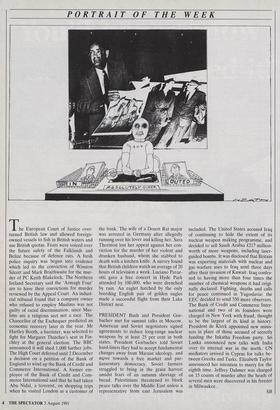PORTRAIT OF THE WEEK
The European Court of Justice over- turned British law and allowed foreign- owned vessels to fish in British waters and use British quotas. Fears were voiced over the future safety of the Falklands and Belize because of defence cuts. A fresh police inquiry was begun into evidence which led to the conviction of Winston Silcott and Mark Braithwaite for the mur- der of PC Keith Blakelock. The Northern Ireland Secretary said the 'Armagh Four' are to have their convictions for murder reviewed by the Appeal Court. An indust- rial tribunal found that a company owner who refused to employ Muslims was not guilty of racial discrimination, since Mus- lims are a religious sect not a race. The Chancellor of the Exchequer predicted an economic recovery later in the year. Mr Hartley Booth, a barrister, was selected to fight for Margaret Thatcher's seat in Fin- chley at the general election. The BBC announced it will shed 1,000 further jobs. The High Court deferred until 2 December a decision on a petition of the Bank of England to wind up the Bank of Credit and Commerce International. A former em- ployee of the Bank of Credit and Com- merce International said that he had taken Abu Nidal, a terrorist, on shopping trips when he visited London as a customer of
the bank. The wife of a Desert Rat major was arrested in Germany after allegedly running over his lover and killing her. Sara Thornton lost her appeal against her con- viction for the murder of her violent and drunken husband, whom she stabbed to death with a kitchen knife. A survey found that British children watch an average of 20 hours of television a week. Luciano Pavar- otti gave a free concert in Hyde Park attended by 100,000, who were drenched by rain. An eaglet hatched by the only breeding English pair of golden eagles made a successful flight from their Lake District nest.
PRESIDENT Bush and President Gor- bachev met for summit talks in Moscow. American and Soviet negotiators signed agreements to reduce long-range nuclear weapons by at least 25 per cent in both states. President Gorbachev told Soviet hard-liners they had to accept fundamental changes away from Marxist ideology, and move towards a free market and par- liamentary democracy. Soviet farmers struggled to bring in the grain harvest amidst fears of an autumn shortage of bread. Palestinians threatened to block peace talks over the Middle East unless a representative from east Jerusalem was included. The United States accused Iraq of continuing to hide the extent of its nuclear weapon making programme, and decided to sell Saudi Arabia £217 million- worth of more weapons, including laser- guided bombs. It was disclosed that Britain was exporting materials with nuclear and gas warfare uses to Iraq until three days after their invasion of Kuwait. Iraq confes- sed to having more than four times the number of chemical weapons it had origi- nally declared. Fighting, deaths and calls for peace continued in Yugoslavia: the EEC decided to send 550 more observers. The Bank of Credit and Commerce Inter- national and two of its founders were charged in New York with fraud, thought to be the largest of its kind in history. President de Klerk appointed new minis- ters in place of those accused of secretly funding the Inkatha Freedom party. Sri Lanka announced new talks with India over its internal war in the north. UN mediators arrived in Cyprus for talks be- tween Greeks and Turks. Elizabeth Taylor announced her intention to marry for the eighth time. Jeffrey Dahmer was charged on 15 counts of murder after the heads of several men were discovered in his freezer in Milwaukee.
SB


















































 Previous page
Previous page